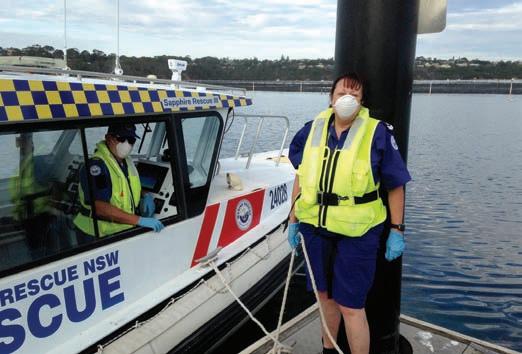
4 minute read
Welfare paramount in pandemic response
Welfare paramount in pandemic response Volunteers, staff adapt quickly to maintain essential services safely.
Marine Rescue NSW reacted swiftly to manage the risks posed by the COVID-19 crisis, putting in place measures to protect its volunteers and staff while ensuring it maintained its essential services to save lives on the water.
Commissioner Stacey Tannos said like the rest of the community, MRNSW had needed to adapt and adjust to new ways of operating in an environment suddenly ruled by an invisible, dangerous enemy.
“This has been an emergency like none other we have ever seen before and it has required an unprecedented response - not just from MRNSW but from us all,” he said. “It has been confronting to face such a severe crisis, especially so soon after the Black Summer bushfires and the storms and floods that followed.”
Commissioner Tannos said the impact of the pandemic had been felt across the service, from radio and vessel operations, training and communications to fundraising activities, unit meetings and the wellbeing of members in isolation.
“Our major concern has been to ensure that we have taken every possible step to minimise the potential risks to the health and welfare of our people. That has been paramount,” he said. ”We needed to be agile and flexible in our response to ensure we kept pace with evolving government rules to help manage the pandemic and also meet our own operational needs.”
The organisation’s response was reviewed daily to ensure it was in line with government requirements and SafeWork NSW guidelines.
“Our people adapted quickly and responsibly, selflessly continuing to put the safety of the boating community first, even during this worrying time for us all,” Commissioner Tannos said.
“I want to thank each of them for their important contribution to managing the pandemic, whether they were on socially distanced duty or, just as importantly, helped everyone stay safe by staying home.”
The first COVID risk management procedures, requiring enhanced hygiene, sanitation and personal health practices, were introduced on March 3.
Measures were escalated twice, to enforce social distancing and take 10 strategically located radio bases offline and limit six others to weekend and public holiday operations to ensure a workforce of volunteers would be available to maintain continuity of service if other units were impacted by the virus. A significant relaxation was introduced in late May, as governments began easing strict community restrictions.
Headquarters staff began working from home on March 17 and are expected to return in July.
MR Merimbula’s Alan Grange and Trish Moxon, in COVID protective masks and gloves, head out to rescue a boat stranded on the bar.

Director of Operations Andrew Cribb said units had constructively implemented the changes to their established operations and adjusted to online rather than face-to-face activities.
“We know many of our members really missed their duties in the radio base or on the rescue vessel but they accepted the changes were necessary,” he said.
Mr Cribb thanked the volunteers who maintained local operations and expanded their watches to remotely monitor radio traffic to offline or limited operation bases.
He said new vessels had been delivered to MR Merimbula, Tuggerah Lakes and Newcastle during COVID-19, with extended induction periods needed to allow for social distancing on board.
IT Director Florian Glajcar said MRNSW had shifted many activities online, predicting this innovation would outlast the pandemic.
“I think across the organisation we all realised that we could achieve a lot without the need to be together in person,” he said.
“Zoom, in particular, proved an easy, practical and effective way for people to hold meetings, undertake training and keep in contact.”
Over eight weeks, 1,953 MRNSW personnel spent 115,694 minutes - or more than 80 days - on Zoom, attending 202 meetings, training sessions or catch ups. In another first, unit Annual General Meetings and elections are being held online, with eligible members voting via a dedicated website. Electronic recruitment processes and corporate invoice approvals were introduced and the Commissioner produced regular video updates for all members.
The Corporate Communications team engaged members and the community through social media safety messaging, MRNSW colouring in activities and posts revealing how volunteers were filling their time off-duty and staff members were working from their home set-ups.
Commissioner Tannos said with community pandemic restrictions being incrementally lifted, he looked forward to a gradual return to “normal” operations.
“lt is likely to be quite some time before we can return to our operational life as we used to know it - if ever,” he said. “Social distancing, enhanced hygiene and cleaning practices and greater awareness of our own personal health will be the new norm for us all for the foreseeable future as we adjust to living with coronavirus.”










